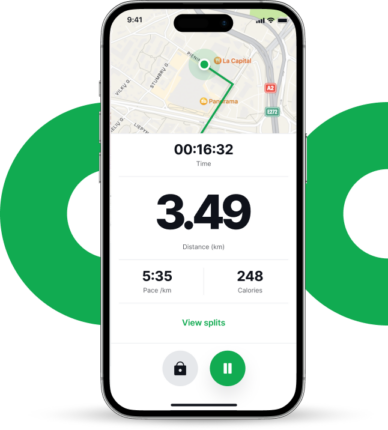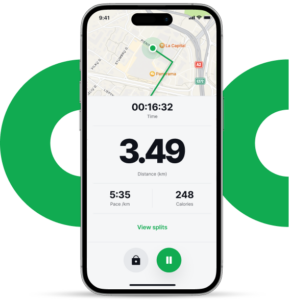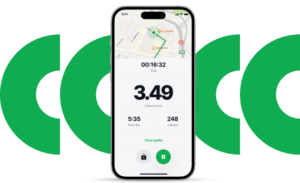Aiming for a good half marathon time? Your journey to the finish line starts here.
Whether you’re new to running or have run a few races already, you don’t have to settle for an average half marathon time. But you do have to know the average finish times to determine your objectives.
In This Article:
How Long Is a Half Marathon?
Some runners are counting their half marathon in miles. Others are counting their half marathon in kilometers. Either way, they’re both running the same distance.
So, how many miles is a half marathon exactly? A half marathon is 21 kilometers or 13.1 miles. It’s a significant leap forward over a 5k or 10k race.
That said, the half marathon distance in miles shouldn’t discourage you. With the right approach to training, you can finish it with a good time. And discover a faster and better runner in you in the process.
How Long Does It Take to Train for a Half Marathon?
It usually takes 10–12 weeks to train for a half marathon. But depending on your fitness level, available training time, and race goals, you may be able to accelerate your training in some cases. However, it’s important to give yourself enough time to train for a half marathon without risking injuries.
Next, let’s see what a good half marathon time looks like.
What Is a Good Half Marathon Time?
A good half marathon time by age depends on your gender, fitness level, weather conditions, and other factors.
If you’re wondering what the average time for a half marathon is, the 2019 State of Running Report sheds some light on this. It features data on the average half marathon time by gender. According to the report, the average half marathon time for men was 2:02:00, and for women – 2:16:00. These times are based on US data.
The world record for a half marathon is 57:32 for men and 1:04:31 for women. Both records were set in 2020. Ethiopian runner Ababel Yeshaneh set the women’s world record at the United Arab Emirates Ras Al Khaimah event early in the year. Kenyan Kibiwott Kandie set the men’s world record at the Valencia Half Marathon in December 2020.
Half marathon times for beginners, advanced, and elite runners between 20–50 years old
Next, let’s zoom in on the average half marathon time by age.
Important: A good half marathon time for a well-trained runner is around 2:00:00 or less. Male runners can aspire even to a 1:45:00 finish.
For more specific half marathon times based on general race data, refer to the tables below. The numbers are rounded.
Average half marathon time for men
| Age | Beginner | Novice | Intermediate | Advanced |
| 20–30 | 02:25 | 02:01 | 01:44 | 01:32 |
| 35 | 02:26 | 02:02 | 01:45 | 01:32 |
| 40 | 02:29 | 02:05 | 01:47 | 01:34 |
| 45 | 02:36 | 02:10 | 01:52 | 01:38 |
Average half marathon time for women
| Age | Beginner | Novice | Intermediate | Advanced |
| 20 | 02:45 | 02:22 | 02:02 | 01:47 |
| 25 | 02:44 | 02:21 | 02:01 | 01:46 |
| 30 | 02:44 | 02:21 | 02:01 | 01:46 |
| 35 | 02:45 | 02:23 | 02:02 | 01:47 |
| 40 | 02:49 | 02:26 | 02:05 | 01:50 |
| 45 | 02:56 | 02:32 | 02:10 | 01:54 |
Factors affecting half marathon times
Male runners can reach a faster speed, which accounts for their faster finishing times. According to the same source, women show less pace variability compared to men. This suggests that women can run a half marathon with a good time even later on in life.
That said, a 2014 study found that most runners see their times slow down after 40. This occurs even if many of them continue to improve their times during their late 30s.
Apart from gender and age, weather and terrain are two other important factors affecting race times. A 2019 study analyzed 382,209 Boston Marathon finishers from 1972 to 2018. Researchers found that tailwind improved finishing times. On the other hand, higher temperatures, precipitation, and increasing wind speed seriously affected performance in most runners. When aiming for a personal record (pr) finish, it’s important to factor these in.
A good half marathon time for males and females despite age
Half marathon times decline with age. But that doesn’t mean you can’t finish with a good time later in life.
Important: A good half marathon time for older runners is under 2:00 for males and under 2:30 for women. After 70, runners can add another 5–30 minutes to that time and still have a good finish.
Check out the charts below for more average times for older runners by gender.
Average half marathon time for older males
| Age | Beginner | Novice | Intermediate | Advanced |
| 50 | 02:43 | 02:16 | 01:57 | 01:43 |
| 55 | 02:50 | 02:22 | 02:02 | 01:47 |
| 60 | 02:58 | 02:29 | 02:08 | 01:52 |
| 65 | 03:07 | 02:36 | 02:14 | 01:58 |
| 70 | 03:17 | 02:45 | 02:21 | 02:04 |
| 75 | 03:31 | 02:56 | 02:31 | 02:13 |
| 80 | 03:53 | 03:14 | 02:47 | 02:26 |
Average half marathon time for older females
| Age | Beginner | Novice | Intermediate | Advanced |
| 50 | 03:06 | 02:40 | 02:17 | 02:00 |
| 55 | 03:17 | 02:50 | 02:26 | 02:08 |
| 60 | 03:30 | 03:01 | 02:36 | 02:16 |
| 65 | 03:45 | 03:14 | 02:47 | 02:26 |
| 70 | 04:03 | 03:29 | 03:00 | 02:37 |
| 75 | 04:23 | 03:47 | 03:15 | 02:51 |
| 80 | 04:50 | 04:10 | 03:35 | 03:08 |
What is a good time for intermediate half marathon runners?
Many recreational runners run a half marathon at an intermediate level. If you’re one of them, aim for a 1:44:00 to 1:52:00 finish if you’re a male between 20 and 45 years. If you’re a female in the same age group, aim for 2:02:00 to 2:10:00.
What is a good time for elite half marathon runners?
Elite male runners can finish a half marathon in under 60 minutes. Elite female runners reach the finish line in under 70 minutes. These times for elite runners are the very top. Most male elite runners aim for a finish between 1:00 and 1:30, while most female elite runners strive toward 1:20 and 1:40.
Basic Tips for Your First Half Marathon
Getting enough training and having the right running shoes is crucial. But there are other things you need to pay attention to.
Speedwork and strength training
Speedwork can increase your lactate threshold. It can make you a faster runner and boost your endurance. Add weekly interval training and tempo runs to your workouts. Hill repeats are another effective way to become a stronger, faster runner.
A 2014 research article found that combining endurance training with heavy strength training or explosive training can increase running performance.
In other words, having a well-rounded workout that trains your muscles can be beneficial. It may improve your half marathon finishing time more than if you focused solely on running.
Together, speedwork and strength training can help you build the reserve energies to finish the last miles of the race strong. And that’s often what makes the difference between top half marathon runners and the rest.
Planning your race day
You don’t want to go too fast, or you may burn your energy early in the race. At the same time, you don’t want to hold back for too long either. Planning your race day makes it easier to achieve a good half marathon time. You want to figure out the best half marathon pace for you.
The University of Northern Colorado provides a half marathon pace chart that can inform your race strategy. Since environmental factors will affect your finish time, you want to check weather forecasts. Also, consider the event route.
Last but not least, know your strengths and weaknesses as a runner. Maybe you start slowly but finish strong? Or vice versa? Adapt your running pace to these to optimize your run.
You can also check out this marathon pace calculator to figure out what pace you should be aiming for.
Mental preparation
Preparing physically for a half marathon is not enough. You want to prepare your mind for the discomforts and challenges that may arise during the race. Visualize yourself running and completing your pace goals. Visualization is a powerful strategy that Olympians and other top athletes are using. Seeing is becoming.
Talk to yourself positively. For example, when the running gets hard, promise to reward yourself with a sports drink or water in five minutes. You can also have a short mantra that you repeat to yourself as you run, such as “Each step matters.” You can also play counting games to take your mind off the strain.
Even if you plan everything carefully, some things may still go wrong. So it’s also important to have backup strategies for coping with pain, stomach upsets, bad weather, and the like.
Half Marathon Training Schedules
Training for a half marathon requires a serious commitment. But it’s possible to fit your runs and other workouts according to your schedule. You can train for a half marathon without giving up on your free time or sacrificing friends and family time. The key is to follow a personalized half marathon plan adapted to your age and fitness level.
Most half marathon training schedules require 10–12 weeks of training. Some runners who are already at a good level may accelerate this to 8–10 weeks if they can already run 5 miles without problems.
Most half marathon training plans feature rest days after demanding runs or workouts. Rest is crucial to build endurance and avoid injuries. You should also expect warm-ups, cross-training, strength training, long and slow distance runs, tempo runs, and interval runs.
Takeaway
To wrap up, here are the things to remember:
- A half marathon is 21 kilometers or 13.1 miles.
- It takes 8–12 weeks to train for a half marathon properly.
- The average half marathon time for men is 2:02:00.
- The average half marathon time for women is 2:16:00.
- A good half marathon finish time for intermediate runners is around 1:45–2:00 for men and 2:10 for women.
- Preparing for a marathon requires more than weekly long-distance runs. You want to do speed work and strength training.
- Planning your race and preparing for it mentally is crucial to achieving a good half marathon time.
After completing your first half marathon, you’ll become a stronger runner. Remember this as you put in all that work into preparing for the big day.
Frequently Asked Questions
How long does it take to train for a half marathon if you can run a 5K?
If you can run a 5K, you can probably train for a half marathon in 8-10 weeks. However, it’s important to start with a base of at least 10 miles of running per week before starting your training plan.
Can I train for a half marathon in 6 weeks?
It is generally not recommended to train for a half marathon in 6 weeks, as this may not give your body enough time to adapt to the increased mileage and intensity. However, if you are an experienced runner and have a strong base of fitness, you may be able to do it successfully.
How much mileage should I run per week to train for a half marathon?
The amount of mileage you should run per week depends on your fitness level, running experience, and the training plan you are following. However, as a general rule, you should aim to increase your mileage gradually over time. For beginners, a good starting point is 20-30 miles per week.
It’s important to listen to your body and take rest days when needed. You should also strength train at least twice a week to build muscle and prevent injury.
How do I build up for a half marathon?
Preparing for a half marathon requires a systematic and progressive training approach. Begin by establishing a baseline of regular running, incorporating a mix of short and long runs. Gradually increase your weekly mileage, allowing for a variety of workouts such as tempo runs, interval training, and a long run each week. Consistency is key, so aim for at least three to four running sessions per week. Include cross-training activities like cycling or swimming to enhance overall fitness and reduce the risk of overuse injuries. As the race date approaches, incorporate specific half marathon distance runs to familiarize yourself with the physical and mental demands of the race. Prioritize proper nutrition, hydration, and adequate rest to support your training. Listening to your body and adjusting the intensity based on how you feel is crucial. Consulting with a running coach or fitness professional can provide personalized guidance and a structured plan tailored to your fitness level and goals.
References:
- Alvero-Cruz, J.R., Standley, R.A., Giráldez-García, M.A. and Carnero, E.A., 2020. A simple equation to estimate half-marathon race time from the cooper test. International Journal of Sports Physiology and Performance, 15(5), pp.690-695.
- Gómez-Molina, J., Ogueta-Alday, A., Camara, J., Stickley, C., Rodríguez-Marroyo, J.A. and García-López, J., 2017. Predictive variables of half-marathon performance for male runners. Journal of sports science & medicine, 16(2), p.187.
- Alvero-Cruz, J.R., 2020. A simple equation to estimate half-marathon race t… ijspp, 2019, p.0518.
- Leyk, D., Erley, O., Ridder, D., Leurs, M., Rüther, T., Wunderlich, M., Sievert, A., Baum, K. and Eßfeld, D., 2006. Age-related changes in marathon and half-marathon performances. International journal of sports medicine, pp.513-517.
- Johansson, M., Atterfors, J. and Lamm, J., 2022. Pacing Patterns of Half-Marathon Runners: An analysis of ten years of results from Gothenburg Half Marathon.














